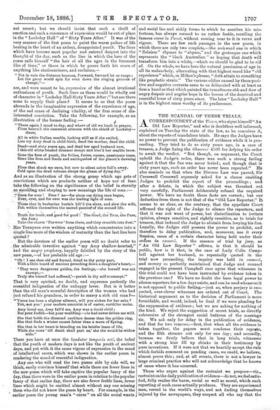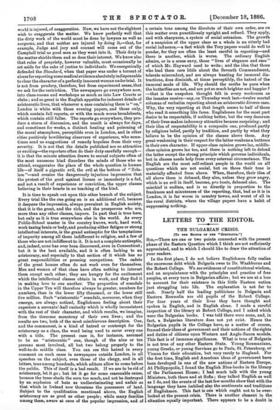THE SCANDAL OF THESE TRIALS.
itCORRESPONDENT of the Times, who signs himself "An Old Law Reporter," and who is doubtless well informed, explained on Tuesday the state of the law, as he conceives it, about the reports of scandalous trials. He says the Judges have no power to prevent the publication of evidence while it is pro- ceeding. They tried to do so sixty years ago, in a case of treason, a Judge fining the Observer £500 for defying his order to await the verdict. "But though, on argument, the Court upheld the Judge's order, there was such a strong feeling against it that the fine was never levied ; and though that is sixty years ago, such an order has never been repeated." He also reminds us that when the Divorce Law was passed, Sir Cresswell Cresswell expressly asked for a clause enabling Judges to prohibit the report of the proceedings ; and after a debate, in which the subject was threshed old very carefully, Parliament deliberately refused the required. power. We have no doubt these facts are correct ; but our deduction from them is not that of the "Old Law Reporter." It seems to us clear, on the contrary, that the appellate Court affirmed the right of the Judge to silence the reporters, and that it was not want of power, but disinclination to irritate opinion, always sensitive, and rightly sensitive, as to trials for treason, that induced the Judge to abstain from levying his fine. Legally, the Judges still possess the power to prohibit, and therefore to delay publication, and, moreover, use it every &pion, cases of a certain character being held under their orders n camerd. If the essence of trial by jury, as "An Old Law Reporter" affirms, is that it should be public, how is it that, in the case of Lady Colin Camp- bell against her husband, so repeatedly quoted in the trial now proceeding, the inquiry was held in canserd, and secrecy so perfectly maintained that Judge and counsel engaged in the present Campbell case agree that witnesses in this trial could not have been instructed' by evidence taken in the previous one P We have no doubt the bare legal power to silence reporters for a few days exists, and can be used whenever it is not opposed to public feeling,—just as, when perjury is sus- pected, over-clever witnesses are ordered out of Court. The historical argument as to the decision of Parliament is more formidable, and would, indeed, be final if we were pleading for the suppression of evidence ; but we are asking for nothing of the kind. We reject the suggestion of secret trials, as directly subversive of the strongest social buttress of the marriage tie. We ask only for delay in the publication of evidence, and that for two reasons,—first, that when all the evidence is taken together, the papers must condense their repots, and the filth streams out only for one day ; and secondly, because we firmly believe that in long trials, witnesses with a 'strong bias fill up chinks in their testimony by pure inventions. If it were not that we heartily accept the rule which forbids comment on pending cases, we could, we believe, almost prove this ; and, at all events, there is not a lawyer in large criminal practice who will not acknowledge that he knows of cases where it has occurred.
Those who argue against the restraint we propose—viz., restraint on the daily publication of evidence—do not, we feel satis- fied, fully realise the harm, social as well as moral, which such reporting of such cases actually produces. They are experienced men, versed in the world's ways, and not finding themselves injured by the newspapers, they suspect all who say that the world is injured, of exaggeration. Now, we have not the slightest wish to exaggerate the matter. We know perfectly well that the dirty work of the world must be done by lawyers as well as surgeons, and that neither are injured by doing it,—that, for example, Judge and jury and counsel will come out of the Campbell trial as good men as they went into it. Their duty in the matter shields them and so does their interest. We know also that rules of propriety, however valuable, must occasionally be set aside for the sake of justice to individuals. We energetically defended the Standard, when that paper was under a torrent of abuse for reporting some medical evidence absolutely indispensable to clear the character of a perfectly innocent woman under trial. It is not from prudery, therefore, but from experienced sense, that we ask for the restriction. The newspapers go everywhere now, into class-rooms and workshops as much as into Law Courts or clubs ; and so great is the English appetite for indecent details of aristocratic lives, that whenever a case containing them is "on," London is white with those evening papers, and those only, which contain full reports, or with the much worse broadsheets, which contain still faller. The reports go everywhere, they pro- duce a storm of discussion, and the result is always for days, and sometimes for weeks, a distinct heating and poisoning of the moral atmosphere, perceptible even in London, and in other cities positively bewildering observers of experience, who some- times send us suggestions of remedy hopeless from their very severity. It is not that the details published are so attractive or exciting—the reporters often do their duty carefully enough— it is that the minute attention drawn to sexual subjects often of the most nauseous kind disorders the minds of those who so attend, exaggerates the place of the whole question in human life—of itself a gigantic evil, the evil at the bottom of "Zola- ism "—and creates the dangerously injurious impression that the protest of the good against license or immodesty is a fad, and not a result of experience or conviction, the upper classes believing in their hearts in no teaching of the kind.
It is time to speak out upon this other branch of the subject. Every trial like the one going on is an additional evil, because it deepens the impression, always prevalent in English society, that it is the great, and the rich, and the prosperous who are, more than any other classes, impure. In part that is true here, bat only as it is true everywhere else in the world. As every Public-School master in the country knows, work, hard work, work taxing brain or body, and producing either fatigue or strong intellectual interests, is the grand antiseptic for the temptations of impurity among all those indifferent to religion, and a few of those who are not indifferent to it. It is not a complete antiseptic, and, indeed, none has ever been discovered, even in Connecticut; but it is the best available, and it is often lacking to an aristocracy, and especially to that section of it which has no great responsibilities or pressing occupations. The cadets of the great houses often do not work even for themselves. Men and women of that class have often nothing to interest them except each other; they are hungry for the excitement which the intellectual classes obtain in work, and they find it in making love to one another. The proportion of scandals in the Upper Ten will therefore always be greater, numbers for numbers, than in the lower fifty thousand, or the lower still five million. Such "aristocratic" scandals, moreover, when they emerge, are always noticed, Englishmen feeling about their superiors a servants'-hall curiosity which is wholly inconsistent with the rest of their character, and which results, we imagine, from the tiresome monotony of their own lives ; and the results are two, both of the most mischievous description. One, and the commonest, is a kind of hatred or contempt for the aristocracy as a class, the word being used to cover every one with a title. The present case is, for instance, assumed to be an " aristocratic " one, though of the nine or ten persons most involved, all but two belong properly to the well-to-do middle class. You can see this hatred in every comment on such cases in newspapers outside London, in all speeches on the subject, even those of the clergy, and in all letters, tens among hundreds, which editors allow to come before the public. This of itself is a bad result. If we are to be rid of aristocracy, let it go ; but let it go for some reasonable cause, because the trees shade the corn too much, and not be destroyed by an explosion of hate as undiscriminating and unfair as that which in Ireland now threatens the possessors of land. Subject to the qualification mentioned above, the English aristocracy are as good as other people ; while many families among them, aware at once of the popular impression, and of a certain tone among the dissolute of their own order, are on this matter even punctiliously upright and refined. They apply, and with sharpness, a system of social ostracism. The growth of a suspicion of the upper class as a whole is an utterly bad social infinence,—a fact which the Tory papers would do well to ponder, for they are often the least careful in reporting—and there is another, which is worse. The ordinary English admire, or in a sense envy, those "lives of elegance and ease" of which Mr. Hayward used to write ; and the idea that those who lead them care little about the Seventh Commandment, tolerate misconduct, and are always hunting for immoral dis- tractions, does diminish, at times perceptibly, the hatred of the immoral mode of life. Why should the moths be pure when the butterflies are not, and are yet so much brighter and happier ? —that is the unspoken thought felt in every workroom as the inmates receive—say, on Thursday week last—twelve mortal columns of verbatim reporting about an aristocratic divorce case. Why, the very reporting at that length seems to half of those who read it something like fame. Englishmen for the most part desire to be respectable, if nothing better, but the very decorum of their lives makes indecency attractive because surprising ; and their idea of respectability is a composite one, produced partly by religious belief, partly by tradition, and partly by what they believe to be the opinion of the classes above them. Any great weakening in their respect for the latter weakens a buttress in their own character. If upper-class opinion grows lax, middle- class opinion grows lax too, and there is nothing left to defend the latter except the strong principle which governs individuals, but in classes needs help from every external circumstance. The English are the most self-reliant people in the world on all questions which are not social, but on those their tone is materially affected from above. When, therefore, their idea of all above them is debased, they also, unless they grow angry, which is an evil in itself, become, pro ianto, debased also. The mischief is endless, and is so directly in proportion to the frankness and minuteness of the reporting, that, bad as it is in London, it is far worse in country towns, and worst of all in the rural districts, where the village papers have a habit of suppressing nothing.











































 Previous page
Previous page